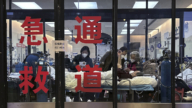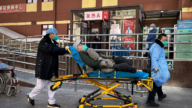【新唐人2013年09月13日訊】9月11號,北京發佈了最新的「2013胡潤百富榜」。上榜的前5名富豪的平均財富比去年翻了一番,前50名的資產至少達到180億。在中國貧富懸殊不斷急劇擴大的情況下,富豪財富依然暴增,以及高層政商之間的深層關係,再次受到輿論的關注。
胡潤研究院發佈的《2013雅居樂海南清水灣胡潤百富榜》顯示,大連萬達集團董事長王健林以1350億財富首次成為第十位中國新首富。
在上證指數比去年同期下降1.7%的前提下,上榜的1000位企業家平均財富卻增長了18.5%,達到64億元。前50名的上榜門檻達到180億,為歷年最高。
時政評論員刑天行指出,在中國老百姓看不起病,甚至一些人吃飯都成問題的情況下,富豪財富的增長,恰恰反映了中國經濟極不正常。
時政評論員刑天行:「中國的財富,它是越來越明顯的表現在集中在少數權貴的手中,它這個不正常的體制,給了特權階層和利用特權階層的商人,一個不正常的聚斂錢財的這麼一個機會,所以他們的財富會急驟的上升。」
中國社會問題研究人士張健認為,在中國能達到富豪級別的商人,背後一定有中共高官撐腰。
中國社會問題研究人士張健:「政府官員與富豪這種官商的勾結,變本加利的盤剝了中國的大部分國有資源,盤剝所有貧下的老百姓的利益,將自己的利益和官商進行去分配,然後把他們所有子女,把他們所有的一切全都弄到了海外來享受這種奢靡的生活。」
日前,一份《中國國際移民報告》顯示:個人資產超過1000萬元的富人中,近60%已完成投資移民或有相關考慮。去年胡潤報告說,超過85%的人計劃將子女送到海外求學。
8月底大陸媒體報導說,據不完全統計,近十多年來至少有上百名有影響的民營企業家落馬,包括至少23名福布斯或胡潤百富榜上榜富豪,其中不乏擔任兩會代表等企業家。
刑天行:「(中共)不管是哪一任上臺,他都要通過反腐去整治一批人,當然整治的也都是跟他自己利益關係不大太的,對他權力構成一定威脅的這一派,那麼必然牽扯到這些商人,相繼的要愛到一些懲處,從某種程度上說,對於商人來講,他也是出於無奈。」
今年6月初,王健林曾經對媒體抱怨說:「現在形成了若干利益集團,國企、國資太強大,這就造成我們創業的機會成本越來越高。所以目前中國需要一次下決心的、落到實處的改革。」
張健:「在中國所有的富豪後邊都有一個政府的體製作為一個背書,他們之所以落馬,不是因為他們在自己經商的過程中犯了甚麼罪受到法律的制裁,只有你站錯了隊,才可能把你以前所有的問題糾出來。」
8月底,中共前政治局委員薄熙來案開審庭理。去年已被關押的大連商人徐明,被曝在90年代和薄熙來聯繫上以後成了億萬富翁。2005年,徐明曾位列福布斯中國富豪榜第八名。
刑天行:「如果中共是一個法制社會的話,這些富豪他不需要一定依靠權力階層,他受到權力階層擠壓的時候,他也可以用法律來保護自己。」
張健指出,中國富豪排行榜曾經被稱作殺豬榜,所以誰上排行榜都有可能隨時面臨著這樣一個問題。他強調,在中共獨裁體制下,誰都沒有安全感。
採訪編輯/李韻 後製/周天
A Shadow Behind China’s Rich List
On September 11, the Chinese authorities
released the latest “2013 Hurun Rich List".
The top five richest saw their wealth doubled. The top
50 richest have assets worth at least 18 billion Yuan.
In China, the gap between rich and poor has
rapidly widened, but tycoon wealth is still soaring.
Relations between the high-level leadership
and business is becoming a public focus again.
According to the latest Hurun’s rich list, Wang Jianlin
has been ranked as number one for the first time.
Wang is in charge of Dalian Wanda Group, and
has a fortune of 135 billion Yuan ($22 billion).
The Shanghai Composite Index
has fallen 1.7% year-on-year.
However, the top 1,000 richest people had their wealth
increase on average of 18.5%, or 6.4 billion Yuan.
The top 50 richest people reached 18 billion Yuan,
which is the highest growth ever.
Xing Tianxing, current affairs commentator:
In China, people can’t afford to see a doctor.
Some people struggle to pay for their food.
The increase of tycoons’ wealth precisely reflects
that the Chinese economy is far from normal.
Xing Tianxing: “China’s wealth is increasingly
being seized in the hands of the few elite.
This abnormal system gives opportunities
to the privileged class and businessmen.
They use the privileged class to seize
wealth, and their fortune rapidly increases."
Zhang Jian, China affairs expert, said that in China, support
from officials must be behind tycoon-level businessmen.
Zhang Jian: “Government officials colluded with
businessmen, and stole the majority of national resources.
They exploited civilian’s interests and re-distributed then.
They send their families and relatives
abroad, and live an extravagant life."
A “China International Migration" reported on rich
whose personal assets are more than 10 million Yuan.
60% of them had completed an investment
immigrant, or have relevant considerations.
Hurun’s report in 2012 reported that more than
85% of the rich sent their children to study abroad.
At the end of August, media in Mainland
China reported more than 100 well-know
private business owners were punished.
23 of them had been listed in the Forbes or Hurun Rich List.
Some of them served as representative
entrepreneurs at the CCP Two Sessions.
Xing Tianxing: “No matter who the new leader is, he must go
through an anti-corruption campaign to remove some people.
These people don’t link too much with his own interests,
and also those who pose a threat to his power.
This is certainly associated with some of
the entrepreneurs who were punished.
For businessmen, they feel they have no other choice."
In June, Wang Jianlin complained to the media:
“Now interest groups, state-owned enterprises
and state-owned resources are too powerful.
This resulted in the cost of starting a
business to become increasingly high.
Thus, China needs a determined and practical reform."
Zhang Jian: “In China, all tycoons have
a government group supporting them.
The reason for the removal of these businessmen, is not
because they committed crimes during business dealings.
It is because they stood in the wrong line."
At the end of August, former Politburo
member Bo Xilai was put on trial,
Xu Ming, a Dalian businessman who
was jailed last year, was exposed.
In the 1990s, Xu became a billionaire
after he managed to get support from Bo.
In 2005, Xu was listed the fifth
richest Chinese person in Forbes.
Xing Tianxing: “If China is a country ruled by law,
businessmen don’t have to rely on the power class.
If one is mistreated by power class,
he can use the law to protect himself."
Zhang Jian said that people who appeared in
China’s Rich List could face punishment at any time.
Under the CCP system, no one feels safe.
























